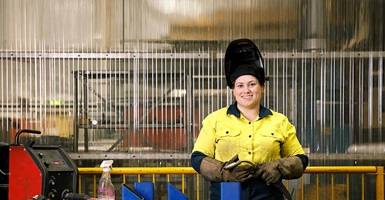Imagine this.
You jump on a plane to London, ready for an exciting new adventure and a fresh start.
You know that when you arrive, you’re pretty much guaranteed to find work in the field you’re passionate about. That’s what hospitality offers.
In this article, Chisholm Hospitality Education Manager Carmel Cammarano explains why hospitality can be such a fulfilling career. First, let’s take a look at what hospitality is.
What is hospitality?
The hospitality sector encompasses a broad category of fields within the service industry. Food and beverage service, accommodation, travel and tourism, attractions and events all fall under the hospitality umbrella.
In terms of food and beverage roles, hospitality covers both front-of house jobs (such as baristas, bartenders, waitresses/waiters or venue managers) and back-of-house roles (like kitchenhands, chefs and cooks).
Why choose to work in hospitality?
1) Travel opportunities
One of the biggest drawcards of hospitality is that you can pick up a job anywhere in the world. The more quailed you are, the easier it will be to find hospitality work.
“You can literally get on a plane, go overseas and pretty much have a job the next day doing whatever career you’ve decided to pursue in hospitality,” says Carmel.
“There are so many fantastic jobs out there. You can work as a super yacht chef, cruise ship bar manager, in the ski fields, at popular tourist destinations or six-star hotels – really cool stuff!”
2) Transferable skills
Carmel says hospitality equips you with skills for life. It’s a great foundation upon which to build your career.
“You get a skillset that is fully transferable to pretty much every other job – customer service skills, finance skills, conflict resolution, multitasking, teamwork, the lot,” she says. “Everything you learn, you can take to any other job you want to do in future.”
3) Flexibility
With hospitality, you’re not stuck behind a desk in a nine to five job or having to battle peak-hour traffic. There’s flexibility to work mornings, afternoons or nights, on weekdays or weekend – whatever suits you.
That means you can free up time for other pursuits such as hobbies, studies, family time or other work.
4) Career progression
Carmel says one of the great misconceptions about hospitality is that there’s no room for growth. That’s not the case.
For example, as a waiter/waitress, you can become a shift supervisor or venue manager. Back-of-house, you can start off as a sous-chef and then end up running the kitchen, a hotel department or your own restaurant.
There are plenty of opportunities for career progression if you have the desire and ambition to pursue them.
5) It’s a fun team environment
Working in hospitality can be a blast. Not only do you meet people from all walks of life, you help create unforgettable experiences for customers.
“People doing hospitality are generally happy to be there because together they are creating something beautiful for someone else,” says Carmel. “Whether that’s with an amazing cocktail or dish, it gives you a real sense of achievement knowing you’ve made someone else feel happy.”
Carmel says often the friends you make in hospitality last you a lifetime.
Debunking myths about working in hospitality
Hospitality is really badly paid
The pay has improved a lot in recent years, according to Carmel. What’s more, in the current job market with so much work available, you can always ask for better pay or seek it out.
You have to work split shifts
Many hospitality venues have moved away from long hours and split shifts, as they want to retain staff by offering better work conditions.
Hospitality is a just a temporary stepping-stone
Another myth is that hospitality is just a job you have on the way to another job. “It can be your whole career – there are lots of avenues to take to set you up for the rest of your life,” says Carmel.
What attributes do you need to work in hospitality?
To work front-of-house, all you need is a desire to take care of people and give them a memorable experience.
“You don’t have to have great customer skills to begin with because you get trained in those,” says Carmel. “Provided you have a desire and a want to do the job, that can be the spark. We’ll teach you the rest.”
And obviously as a chef, the number one attribute you need is a passion for food.
Hospitality courses
Chisholm offers a variety of courses to help you get started in hospitality.
Popular short courses include Introduction to Coffee, Barista and Coffee Training, and Responsible Service of Alcohol (RSA).
Chisholm’s Certificate III in Hospitality is a great foundation course covering all the basics of working in hospitality.
Students learn about everything from providing advice on food and beverage matching and making coffee and cocktails, to showing social and cultural sensitivity and using hygiene practices. The Certificate III in Hospitality can be completed in six months full time.
There’s also a range of cookery and patisserie courses on offer.
Chisholm’s hospitality courses can also help give you the skills you need to turn your “side hustle” into a business. For example, if you love baking cookies or making jams, you could start your own business.
Hospitality career opportunities
Hospitality is a stable industry and hospitality workers are almost always in demand. The Australian Government’s Labour Market Insights website puts future growth of accommodation and food services at 13.2% over the next five years.
Whether you’re looking to become a barista, waiter/waitress, bartender or sommelier, chef or pastry chef, there are plenty of hospitality career pathways and opportunities out there, says Carmel.
Tips for getting started
Above all else, employers want to see that you’re enthusiastic and keen to work in hospitality. Being neatly presented is also important, particularly if you are customer-facing.
Having a qualification such as a Certificate III in Hospitality will also hold you in good stead in a job interview, as it shows you are serious about pursuing a career in hospitality.
Hospitality salaries
The question you may be asking by this point is how much do hospitality jobs pay?
Generally speaking, starting salaries are often around $55,000 and can range up to $110,000, says Carmel. “The pay is so much better than it used to be,” she says.
As a casual, the award rate will depend on your age, experience and location.
Like to find out more?
Ready to get started in hospitality? Browse Chisholm’s hospitality and cookery courses or get in touch to explore the different career paths in hospitality.


